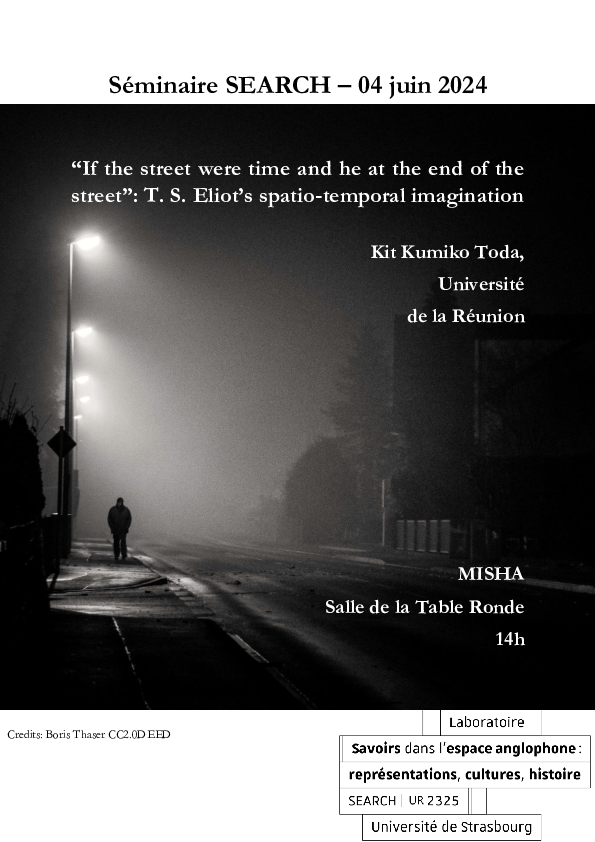Séminaire SEARCH avec Kit Kumiko Toda (Université de la Réunion)
“If the street were time and he at the end of the street”: T. S. Eliot’s spatio-temporal imagination
Dr. Kit Kumiko Toda, Université de la Réunion
Eliot’s first published poem, “The Love Song of J. Alfred Prufrock” (1915), famously opens with the narrator inviting us for an evening walk through “certain half-deserted streets”, and, in joining him, we arrive “upon the beach”, at the shore of his anticipated old age. The Bergsonian “Rhapsody on a Windy Night” (1915) also takes us on an insomniac’s stroll, “through the spaces of the dark”, in murky slums of muttering streetlamps, where “Midnight shakes the memory” and the passing hours are tolled at the start of each stanza. The Waste Land (1922)leads us through the Dantean “Unreal City”, tracing Eliot’s commute over London Bridge and down King William Street “to where Saint Mary Woolnoth kept the hours / With a dead sound on the final stroke of nine”.
In Eliot’s pre-1927 poetry, his sense of time, particularly the psychological perception of the passing of time, is repeatedly envisioned in (urban) spatial terms, something made explicit in “The ‘Boston Evening Transcript’” in which the narrator turns “Wearily, as one would turn to nod good-bye to La Rochefoucauld, / If the street were time and he at the end of the street”. In 1927, Eliot was baptised into the Anglo-Catholic Church and his poetry shows an increasing preoccupation with Christian theological matters, as well as a distinctly liturgical turn in his poetics. This turn, I argue, was also accompanied by a turn in his spatio-temporal sense: in his poem Ash-Wednesday (1930), we find Eliot explicitly insisting “I know that time is always time / And place is always and only place”. Nevertheless, spatial conceptions of time persist prominently, albeit differently, in his work; the culminating final stanza of the final poem of Four Quartets opens with the affirmation: “With the drawing of this Love and the voice of this Calling/ We shall not cease from exploration / And the end of all our exploring / Will be to arrive where we started/ And know the place for the first time”. The solemn pun on “end” attests to a merging of temporal termination with spatial destination in Eliot’s vision. This paper will analyse Eliot’s evolving spatial-temporal imagination, tracing his work from the “end of the street” to the “end of all our exploring”.
Biographical note:
Kit Kumiko Toda is an MCF in English Literature and Translation at l’Université de la Réunion. Brought up in England, she took her degrees at University College London and the University of Cambridge before relocating to France. She has published articles in Review of English Studies, Resources for American Literary Study, Essays in Criticism and Shakespeare en devenir. She has a contract with Routledge for a book on T.S.Eliot’s Elizabethan Imagination (planned publication 2025). She has contributed reviews for the Times Literary Supplement and was the founding editor of The Literateur magazine, which has been digitally archived in the Contemporary British Publications collection of the British Library.
Date : 4 juin 2024
Horaire : 14h-16h
Lieu : MISHA, Salle de la Table Ronde
Contact : Rémi Vuillemin, vuillem[at]unistra.fr
